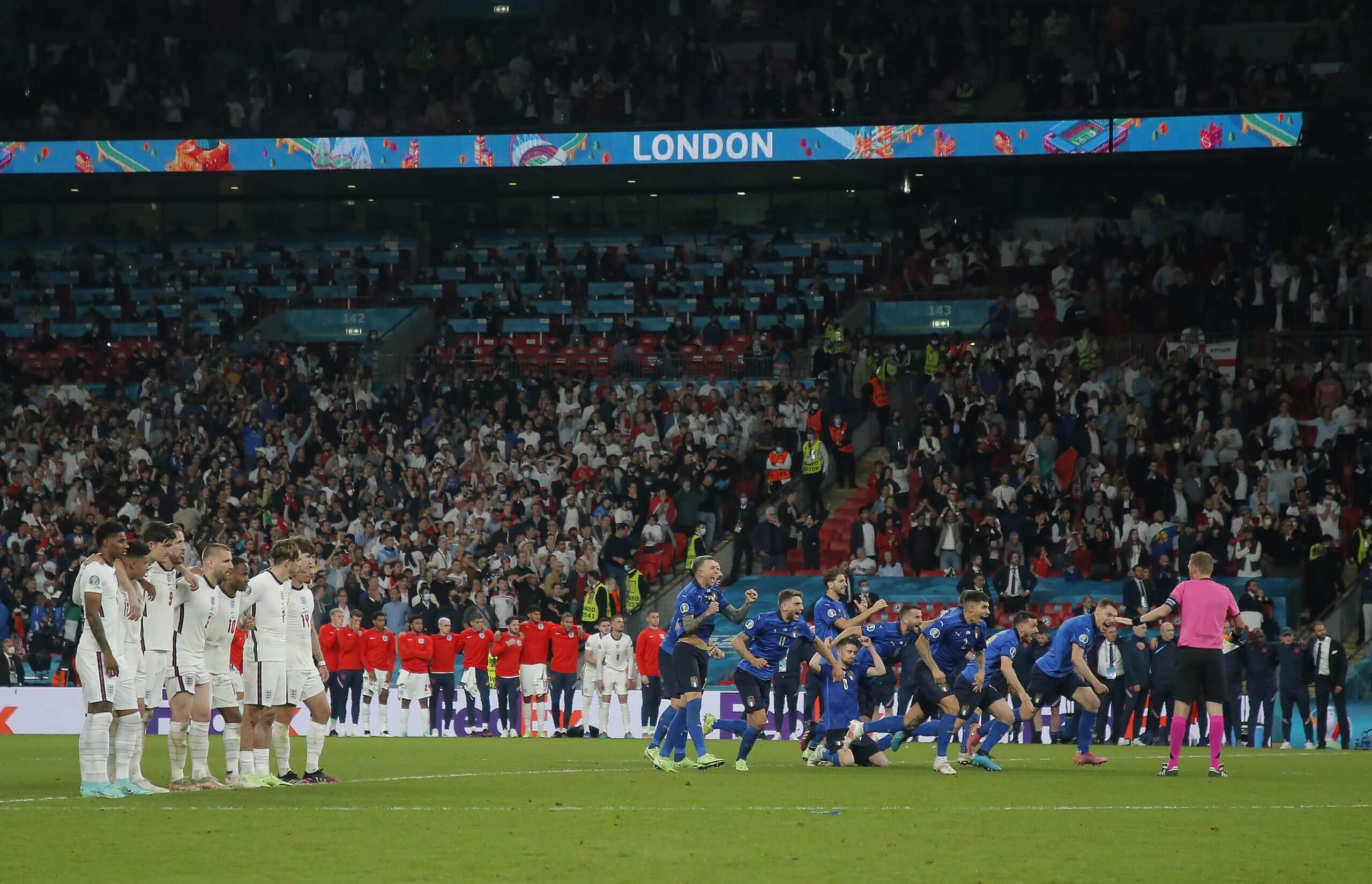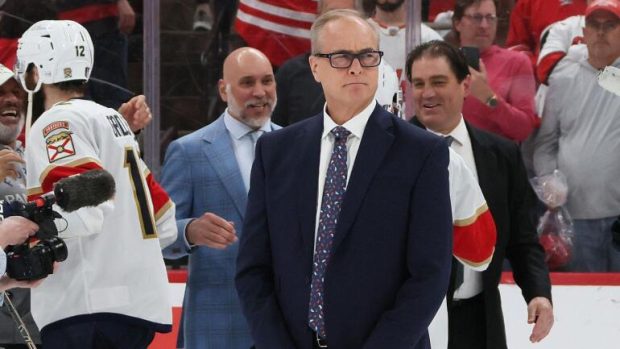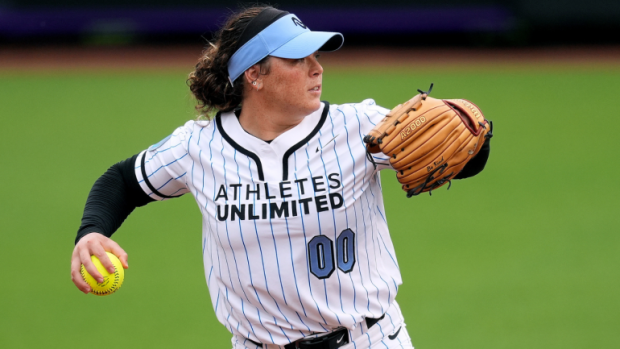
During a Manchester United training session at Carrington, Bruno Fernandes received an unusual request.
Kirsten Heukels wanted to know if the club’s captain could score a penalty with his eyes closed. Fernandes’ only question to the woman standing in high heels on the sidelines was whether he needed to complete a run-up before striking the ball. The answer was yes, and his eyes needed to be closed for that, too.
Advertisement
Fernandes closed his eyes, took a run up and then rippled the back of the net with a perfectly-struck penalty, to the delight of Heukels.
To Sir Jim Ratcliffe, the minority owner at United, albeit with full control over football operations, Heukels was a symbol of excess, a “body language consultant” he said the club were paying £175,000 (almost $237,000) a year.
Although he did not name Heukels in his recent interviews with The Times and The Daily Telegraph, Ratcliffe held up her alleged salary as an example of the money that was being wasted at Old Trafford. This formed part of his defence when discussing the hundreds of redundancies being made at the club.
The reality is Heukels’ remarkable work goes beyond that of a “body language consultant” — and her impact at United was felt during their FA Cup triumph in 2023-24, which generated the club millions of pounds in revenues as the win earned them a spot in this season’s Europa League, where they eventually reached the final.
After discovering Heukels’ identity, The Athletic travelled to Rotterdam to discuss her work, her role under then United manager Erik ten Hag, why she asked Fernandes to take a penalty with his eyes closed, how she prepared the team for spot-kick success on the way to winning the FA Cup and what she made of Ratcliffe’s comments.
Heukels, the founder of 1for2 Social Innovation, is not, as she made clear to The Athletic during a wide-ranging chat in her Rotterdam office, from a football background.
So much so that when the opportunity to work with Ten Hag at United arose, Steve McClaren, one of Ten Hag’s assistants, and Richard Hartis, the first-team goalkeeper coach, complied — in her words — a “football for dummies PowerPoint presentation” to give her a crash course.
But she wasn’t hired by Ten Hag on a consultancy basis to analyse the offside rule. Instead, Heukels spent seven days a week from February 2023 to May 2024 analysing goalkeepers and penalty-takers to try to give United the edge in shootouts and on in-game penalties.
Advertisement
“I analyse by looking at their micro-facial expressions, combined with body language and uses of voice,” Heukels says. “If you get good at it, you can see everything coming because, as people say, eyes are the portal to the soul.
“They tell you what you think and feel before your mouth can say it or your body can show it.”
You may wonder how Heukels — who has worked with the Dutch government on hostage-crisis negotiations, analysed whether an investment firm should invest billions of pounds in another company and acted as a confidential counsellor to other businesses — ended up in football.
It was a “total coincidence”, she says, stemming from a family holiday in 2021. Italy versus England in the European Championship final was on TV and Heukels claimed she would know what was going to happen in the climactic penalty shootout before boot met ball.
“I said to my husband, ‘Give me a pen and paper, I will predict them for you’. And I did, and they were all correct.”

Italy beat England on penalties in the Euros final four years ago (Tom Jenkins/Getty Images)
There is a science behind Heukels’ method.
“It’s part of psychology and emotions, but the easiest way to explain this is that, as human beings, we have six channels of communication,” she explains. “And by looking at body language, uses of voice, facials and micro-expressions in the face, you have four to five of those six.
“It is a combination of psychology, psycho-physiology, linguistics, but also sociology and culture. A lot is culturally defined.”
After her successful predictions in that Euros final, it was Bas, Heukels’ husband, who suggested she contact someone who works in football.
“But I didn’t know anyone, except for the old CFO (chief financial officer) at Ajax,” she added. “I called him and asked what to do. He said there are only two people you can call here: Louis van Gaal and Erik ten Hag. He said they are the only ones innovative enough to understand what you mean.”
Advertisement
Heukels wrote to the two Dutch managers, although she is not certain Van Gaal saw her letter, as he had been diagnosed with prostate cancer.
“He (Ten Hag) called and suggested a meeting,” she recalls. “He quickly said, ‘Oh, so we can do this and we can do that’.”
Heukels describes Ten Hag, then in charge of Amsterdam club Ajax in the Eredivisie, as a “quick thinker”, although two weeks after their chat, it emerged he was leaving that job to manage United.

From left: McClaren, United psychologist Rainier Koers, Heukels and Hartis with the FA Cup (courtesy of Heukels)
Though Ten Hag was still getting his feet under the table at Old Trafford, he remained sold on what Heukels could offer, especially as he was determined to improve a record of one win in the club’s six previous penalty shootouts. Heukels joined on a consultancy basis in February 2023, midway through his first season. “It was bold of Erik and his team,” she says of his decision to hire her. “He was interested and curious, but also strict and made clear I needed to have results.”
Heukels received a login for Wyscout — used for scouting, recruitment and performance analysis — and footage from training, including from specially-installed multi-angle cameras that show facial expressions and one focused on filming people from the neck down.
McClaren and Hartis were her two main ports of call, with conversations weekly, although it was common for them all to be in touch daily. She also spoke to United’s goalkeepers two or three times during her time at the club.
It was initially David de Gea and Tom Heaton, only for De Gea to leave at the end of that 2022-23 campaign and be replaced as first-choice by Andre Onana.
“I asked the goalkeepers what they want to know and what’s important for them, because each goalkeeper looks at different things,” Heukels explains. “One will look at the opponent’s legs first, the other may look at other parts as signs of body language. There is no right or wrong way to do that, but when you expand what you are already doing, the analysis is only going to keep getting better and more effective over time.”
Advertisement
Heukels says Heaton and Altay Bayindir, who joined in September 2023, were the “most curious”, while also highlighting De Gea is “such a beautiful human being”.
She would trawl through Wyscout to watch opposition penalty takers, then inform McClaren and Hartis of her analysis.
The big breakthrough came when United beat Brighton & Hove Albion on penalties in an FA Cup semi-final in April 2023 before she predicted Aleksandar Mitrovic’s penalty for Fulham against De Gea a month later. It was the Spaniard’s first penalty save at Old Trafford since 2014.

De Gea celebrates saving a Fulham penalty in 2023, his first at Old Trafford in almost nine years (Martin Rickett/PA Images via Getty Images)
“I look at how they are walking up to the spot,” Heukels explains. “How their face is holding itself, because you can think you’re looking cool but your face will tell me more and you will leak it all.
“I will look at body language and their interaction with the goalkeeper — whether they are looking at him or not.”
Heukels would also notice if body movements before a penalty gets taken indicate where the player will direct the ball. Equally, if she has spotted that a certain taker doesn’t react well to being goaded by the opposition goalkeeper, then that was also relayed to McClaren and Hartis.
“I did sit with the goalkeepers once in a while to interact about what to look for, how to react, how you can really react the best to this person or to this person, but taking into account their own feelings and wishes,” she adds.
Manchester City’s Erling Haaland, Heukels says, is “really predictable”, although she laughed and wouldn’t share what makes his spot-kick routine easy to profile.
Such was the depth of her work, Heukels will know which way Onana is going to dive before a penalty is struck.
“He is predictable to me, but I don’t know how predictable he is to someone else,” she says.
It wasn’t just United’s goalkeepers receiving in-depth information. Heukels compiled similar dossiers on opposition goalkeepers for the club’s penalty takers.
Advertisement
“When we looked at the training footage, some weren’t that comfortable taking penalties,” Heukels says. “When I came, Diogo Dalot was not yet taking important penalties, and he’s really talented. So, I said, ‘You need to put him in’. Steve was like, ‘OK!’. Steve was really open to the experiment.
“With one player, I suggested they take a different penalty because what he was doing did not fit with his body language, so I said to kick it to the other side, mid-to-high, because you could tell his body would then move in a natural way and he could do it easily.”
It was Fernandes who caught her eye, though.
“Bruno is an intuitive penalty taker. There are more intuitive penalty takers, but I haven’t seen anyone like him,” she adds. “To me, intuitive means you can shoot anywhere, any time. I even asked Bruno to do it with his eyes closed and he did. He’s very hard to predict.”
Heukels also volunteered to profile referees “because you can see just about everything”, but with VAR regularly making headlines, the club, she says, didn’t want to “rock another boat”.
The defining moment of Heukels’ time at United came during their 2023-24 FA Cup triumph. On their way to seeing off Manchester City in the final, United beat Coventry City in the semis on penalties in a dramatic shootout.
“I almost cried out of stress!” Heukels says, with a grin on her face.
Having predominantly worked from her office in Rotterdam, Heukels was at Wembley to watch Ten Hag’s side beat neighbours City, 2-1.
“For somebody who didn’t have anything to do with football, when you’re into the system, it isn’t even about the football,” she reflects. “It’s about the stress that you see with the guys. I couldn’t talk at the stadium!”
Looking back on her time at United, Heukels continually credits McClaren and Hartis for “paving the way” and “translating” her findings and combining them with their expertise so they would be understood by footballers, while also praising Rob Page and Luke Wright, two first-team performance analysts.
Heukels was happy to continue her work beyond that 2023-24 season, but it was an uncertain summer as the club sought an alternative to Ten Hag, only to then decide to keep him on.
Her time at United coincided with the Glazer family selling a minority shareholding to INEOS, the global petrochemicals firm owned by British billionaire Ratcliffe, in February last year. As part of the $1.3billion (£960m) deal, Ratcliffe was given full control of the club’s football operations.
Advertisement
“The summer came and there were a lot of problems in the club,” Heukels says, before noting she didn’t talk to anyone at INEOS.
Asked whether Ratcliffe’s recent comments about her were upsetting to read, Heukels is diplomatic.
“I don’t look at life this way,” she says. “I believe it was a courageous thing that the team did back then. And I’m proud of what we achieved. The achievements are in the data, so they are proven. I don’t need to explain that to anybody.
“I don’t know enough about him or United today because I’m not involved, but it’s always dangerous to talk about your predecessors this way.”
When you consider Heukels’ profiling work has involved the release of hostages, helping Onana save a penalty feels rather secondary in importance — but that does not detract from the fact her input at United helped make a difference.
(Top photos: Kirsten Heukels; Justin Tallis/AFP via Getty Images)
This news was originally published on this post .









Be the first to leave a comment